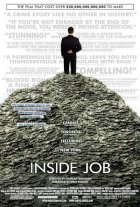
Inside Job Page #16
02:
37:34.26BARACK OBAMA:
The era of greed and irresponsibility on Wall Street and inWashington has led us to a financial crisis as serious as any that we have faced since
the Great Depression.
NARRATOR:
When the financial crisis struck just before the 2008 election, BarackObama pointed to Wall Street greed and regulatory failures as examples of the need for
change in America.
BARACK OBAMA:
A lack of oversight in Washington and on Wall Street is exactly whatgot us into this mess.
NARRATOR:
After taking office, President Obama spoke of the need to reform thefinancial industry.
02:
38:09.04{SEPTEMBER 14, 2009}
BARACK OBAMA:
We want a systemic-risk regulator; increased capital requirements.We need a consumer financial protection agency; we need to change Wall Street's
culture.
Inside Job transcript – Sony Pictures – September 2010
70
NARRATOR:
But when finally enacted in mid-2010, the administration's financialreforms were weak; and in some critical areas, including the rating agencies, lobbying,
and compensation, nothing significant was even proposed.
02:
38:32.28ROBERT GNAIZDA:
Addressing Obama and, quote, regulatory reform: my response, ifit was one word, would be: Ha!
There’s very little reform.
CHARLES FERGUSON: How come?
ROBERT GNAIZDA:
It's a Wall Street government.02:
38:51.27{APPLAUSE}
NARRATOR:
Obama chose Timothy Geithner as Treasury secretary. Geithner was thepresident of the New York Federal Reserve during the crisis, and one of the key players
in the decision to pay Goldman Sachs 100 cents on the dollar for its bets against
mortgages.
ELIOT SPITZER:
When Tim Geithner was testifying to be confirmed as Treasurysecretary, he said, I have never been a regulator. Now that said to me, he did not
understand his job as president of the New York Fed.
{TIMOTHY GEITHNER DECLINED
TO BE INTERVIEWED FOR THIS FILM.}
02:
39:24.07NARRATOR:
The new president of the New York Fed is William C. Dudley, the formerchief economist of Goldman Sachs, whose paper with Glenn Hubbard praised
derivatives.
Geithner's chief of staff is Mark Paterson, a former lobbyist for Goldman; and one of the
senior advisors is Lewis Sachs, who oversaw Tricadia, a company heavily involved in
betting against the mortgage securities it was selling.
02:
39:48.08 To head the Commodity Futures Trading Commission, Obama picked GaryGensler, a former Goldman Sachs executive who had helped ban the regulation of
derivatives.
Inside Job transcript – Sony Pictures – September 2010
71
To run the Securities and Exchange Commission, Obama picked Mary Shapiro, the
former CEO of FINRA, the investment-banking industry's self-regulation body.
02:
40:08.14 Obama's chief of staff, Rahm Emanuel, made 320,000 dollars serving onthe board of Freddie Mac.
Both Martin Feldstein and Laura Tyson are members of Obama's Economic Recovery
Advisory Board. And Obama's chief economic advisor is Larry Summers.
02:
40:27.25ELIOT SPITZER:
The most senior economic advisors are the very people who werethere, who built the structure.
WILLEM BUITER:
When it was clear that Summers and Geithner were going to playmajor roles as advisors; first, uh, I knew this was going to be status quo.
NARRATOR:
The Obama administration resisted regulation of bank compensation,even as foreign leaders took action.
02:
40:48.26CHRISTINE LAGARDE: I think the financial industry is a service industry; it should
serve others before it serves itself.
NARRATOR:
In September of 2009, Christine Lagarde and the finance ministers ofSweden, the Netherlands, Luxembourg, Italy, Spain, and Germany called for the G20
nations, including the United States, to impose strict regulations on bank compensation.
And in July of 2010, the European Parliament enacted those very regulations. The
Obama administration had no response.
02:
41:22.15SATYAJIT DAS:
Their view is, this is a temporary blip, and things will go back tonormal.
{AUGUST 25, 2009}
BARACK OBAMA:
And that is why I am reappointing him to another term as chairmanof the Federal Reserve. Thank you so much, Ben.
NARRATOR:
In 2009, Barack Obama reappointed Ben Bernanke.BEN BERNANKE:
Thank you, Mr. President.02:
41:40.11Inside Job transcript – Sony Pictures – September 2010
72
NARRATOR:
As of mid-2010, not a single senior financial executive had been criminallyprosecuted, or even arrested; no special prosecutor had been appointed; not a single
financial firm had been prosecuted criminally for securities fraud or accounting fraud.
The Obama administration has made no attempt to recover any of the compensation
given to financial executives during the bubble.
02:
42:05.11ROBERT GNAIZDA:
I certainly would think of criminal act-, action against some ofCountrywide's top leaders, like Mozilo. I'd certainly look at Bear Stearns, Goldman
Sachs and Lehman Brothers, and Merrill Lynch.
CHARLES FERGUSON: For criminal prosecutions.
ROBERT GNAIZDA:
Yes. Yes.CHARLES FERGUSON: In, in regard to –
ROBERT GNAIZDA:
They'd be very hard to, to win.CHARLES FERGUSON: Yeah.
ROBERT GNAIZDA:
But I think they could do it, if they got enough underlings to tell thetruth.
02:
42:31.05NARRATOR:
In an industry in which drug use, prostitution, and fraudulent billing ofprostitutes as a business expense occur on an industrial scale, it wouldn't be hard to
make people talk, if you really wanted to.
02:
42:43.13KRISTIN DAVIS:
They gave me a plea bargain, and I t-, I took it. Um, they were notinterested in any of my records; they weren't interested in anything.
CHARLES FERGUSON: They were not interested in your records.
KRISTIN DAVIS:
That's correct. That's correct.02:
42:54.15ELIOT SPITZER:
There is a sensibility that you don't use people's – uh, personal vicesin the context of Wall Street cases, necessarily, to get them to flip. I think maybe it's,
after the cataclysms that we've been through, maybe people will reevaluate that. I'm, I'm
not the one to pass judgment on that right now.
Inside Job transcript – Sony Pictures – September 2010
73
02:
43:15.28{FEDERAL PROSECUTORS WERE PERFECTLY HAPPY
TO USE ELIOT SPITZER'S PERSONAL VICES
TO FORCE HIM TO RESIGN IN 2008.
THEY HAVE NOT DISPLAYED A SIMILAR ENTHUSIASM
02:
43:27.25REP. MICHAEL CAPUANO: You come to us today, telling us, we're sorry; we didn't
mean it; we won't do it again; trust us.
Well, I have some people in my constituency that actually robbed some of your banks.
And they say the same thing! They're sorry, they didn't mean it; they won't do it again.
02:
43:48.11NARRATOR:
In 2009, as unemployment hit its highest level in 17 years, MorganStanley paid its employees over 14 billion dollars; and Goldman Sachs paid out over 16
billion. In 2010, bonuses were even higher.
02:
44:03.26ANDREW SHENG:
Why should a financial engineer, uh, be paid, uh, four, four times toa hundred times more than the, a real engineer? A real engineer build bridges; a
financial engineer build, build dreams. And uh, you know, when those dream turn out to
be nightmares, other people pay for it.
Translation
Translate and read this script in other languages:
Select another language:
- - Select -
- 简体中文 (Chinese - Simplified)
- 繁體中文 (Chinese - Traditional)
- Español (Spanish)
- Esperanto (Esperanto)
- 日本語 (Japanese)
- Português (Portuguese)
- Deutsch (German)
- العربية (Arabic)
- Français (French)
- Русский (Russian)
- ಕನ್ನಡ (Kannada)
- 한국어 (Korean)
- עברית (Hebrew)
- Gaeilge (Irish)
- Українська (Ukrainian)
- اردو (Urdu)
- Magyar (Hungarian)
- मानक हिन्दी (Hindi)
- Indonesia (Indonesian)
- Italiano (Italian)
- தமிழ் (Tamil)
- Türkçe (Turkish)
- తెలుగు (Telugu)
- ภาษาไทย (Thai)
- Tiếng Việt (Vietnamese)
- Čeština (Czech)
- Polski (Polish)
- Bahasa Indonesia (Indonesian)
- Românește (Romanian)
- Nederlands (Dutch)
- Ελληνικά (Greek)
- Latinum (Latin)
- Svenska (Swedish)
- Dansk (Danish)
- Suomi (Finnish)
- فارسی (Persian)
- ייִדיש (Yiddish)
- հայերեն (Armenian)
- Norsk (Norwegian)
- English (English)
Citation
Use the citation below to add this screenplay to your bibliography:
Style:MLAChicagoAPA
"Inside Job" Scripts.com. STANDS4 LLC, 2025. Web. 24 Feb. 2025. <https://www.scripts.com/script/inside_job_42>.







Discuss this script with the community:
Report Comment
We're doing our best to make sure our content is useful, accurate and safe.
If by any chance you spot an inappropriate comment while navigating through our website please use this form to let us know, and we'll take care of it shortly.
Attachment
You need to be logged in to favorite.
Log In